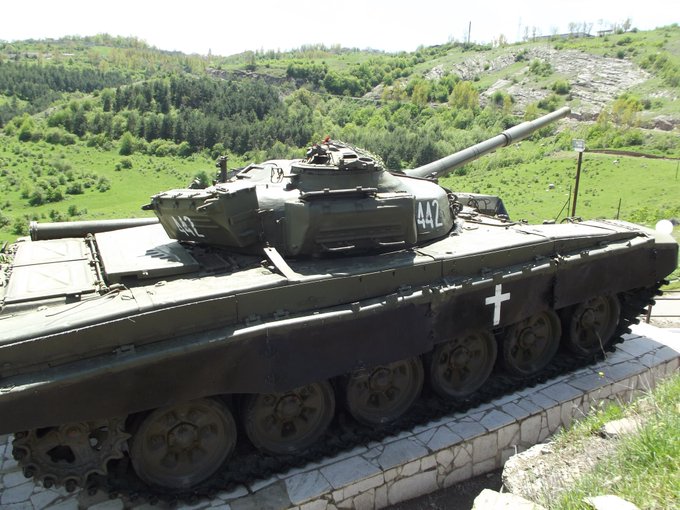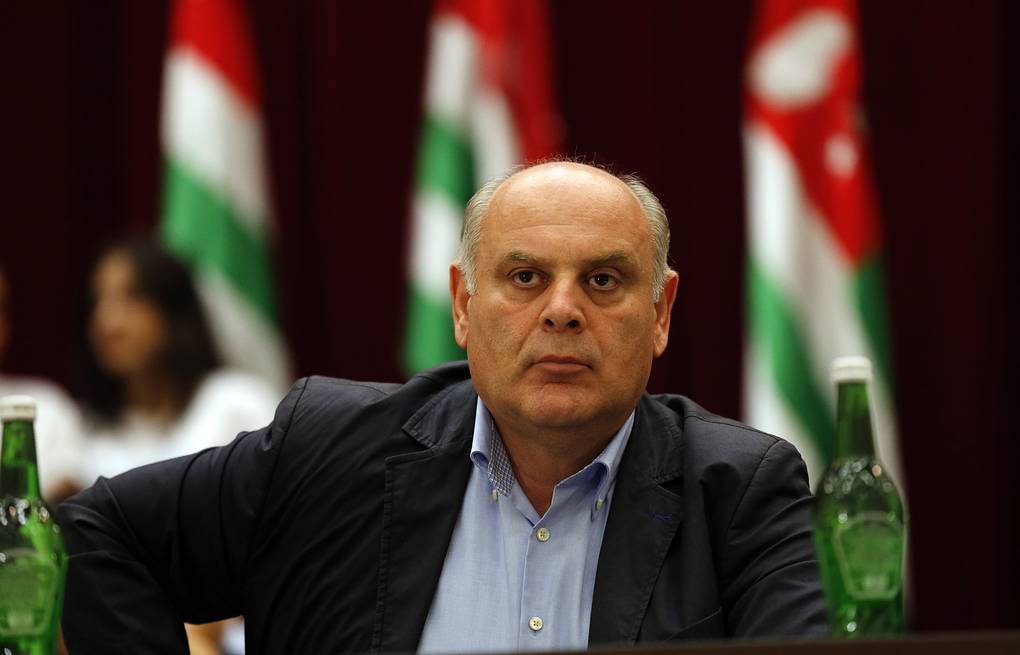Overview of 2020: Separatism, Non-recognition, and Borders in a Pandemic
For most states, 2020, the year of the pandemic, was a challenging one. The role that borders and international relations have had in the last decades was turned upside-down in 2020 as states tried to stop the spread of COVID-19 and secure medical assistance to their own citizens. Some separatist governments found themselves in a precarious position, relying on their parent states in ways they have not needed to in years. Some parent states used the unique opportunity of diverted priorities in international affairs to make strategic moves against separatist groups. Although many de facto states remained relatively unchanged in status and functionality, politicians and citizens of de facto states around the world did face unparalleled difficulties. In light of this and in order not to neglect the developments in the lesser recognized world, the De Facto States Research Unit provides a uniform overview of important events in de facto states from the year 2020.
The Republic of Abkhazia
The Georgian-Abkhaz border has been closed with few exceptions since February due to the pandemic. Particularly for ethnic Georgians in the Gali region who commute to Georgia for work or to sell their goods for higher prices, conditions have been worsening. Electricity shortage has become a prevalent issue – the Inguri hydroelectric power station, practically Abkhazia’s sole source of electricity, will shut down mid-January for major repairs until May. This has pressured the government, already short on money and struggling to handle the pandemic, to improve relations with Russia to secure loans. In return, the Russian government asked Abkhaz officials to agree to Russians purchasing real-estate in Abkhazia, Russians obtaining dual citizenship, and Russian companies to enter the local energy market amongst other things. These Russian interests have been made known before, but have been avoided by previous Abkhaz administrations. An agreement was published late November and approved by both President Bzhania and Prime Minister Ankvab; many are concerned that this jeopardizes Abkhaz sovereignty significantly.
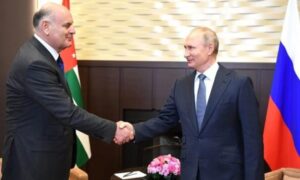
Image: Aslan Bzhania meeting Vladimir Putin in Sochi, November 12 (Source: kremlin.ru)
The Autonomous Region of Bougainville
2020 started off positively after a non-binding referendum at the end of 2019 revealed that an overwhelming majority (98%) of Bougainville residents strive for independence. Taoiseach Bertie Ahern, a former Irish politician who helped organize the independence referendum, is now helping Bougainville in leading their discussions with Papua New Guinea. The election, delayed due to the pandemic, took place in September and Ishmael Taroama, former commander of the Bougainville revolutionary army, was elected leader of the autonomous region. Relations with Papua New Guinea remain stable, an opening for the autonomous region in the National Parliament is expected to be taken by the son of a former Bougainville politician, Peter Tsiamalili. President Toroama stated that the independence preparations are in an advanced phase and he plans to continue talks with Port Moresby next year once the situation in Papua New Guinea stabilizes. The pandemic has slowed talks with Papua New Guinea throughout 2020. The outbreak of Coronavirus arrived late to Bougainville, but proved to be harmful for the island group as their healthcare institutions are largely dependent on materials, labs, and support in Port Moresby.
Donbas (Luhansk and Donetsk People’s Republics)
Due to Covid-19 spread, Ukrainian President Zelenskyy closed the border to the separatist controlled territory in March. The border, usually crossed daily by thousands, could only be crossed if the person had a registered address on the Ukrainian or separatist side – a one-way ticket. Families were split, and pensioners living in breakaway territories but registered in Ukraine proper lost access to their pensions from the government in Kyiv. There are signs that the pandemic has significantly weakened the separatist governments thereby increasing their reliance on Ukraine and Russia. As regional and local elections were held in Ukraine in autumn, the disagreements in Minsk II implementation equated to no election being held in the separatist republics. In Putin’s press conference in December, he claimed that Ukrainian politicians do not want to implement Minsk II and he expects Russia to increase its support for the separatist governments. Putin has pushed for the government in Kyiv to meet directly with leaders of the Donbas People’s Republics as Russia’s official view is that the war is a domestic issue. Russia again attempted to bring the two sides to meet at a UN security council meeting in December – Ukraine refused. Despite the pandemic and the 8th ceasefire since 2018 coming into use in July, there have been thousands of documented ceasefire violations and dozens of wounded soldiers and civilians.
The Republic of Kosovo
In March after criticism amid the spreading and handling of the pandemic in Kosovo, the government also suffered a no confidence vote. In July, after a 20-month hiatus, a meeting between Kosovo and Serbia to normalize relations took place. Prime Minister Hoti of Kosovo signed a joint agreement with Serbian President Vučić to start a joint initiative to locate more unfound bodies of Serbs and Kosovo Albanians killed during the war. In September, both Hoti and Vučić met with U.S. President Trump in Washington, D.C. and signed an agreement to renew economic relations. This further normalization of relations is good for both countries, but perhaps better for Serbia because the White House did not force Vučić to recognize Kosovo’s independence as a prerequisite for the agreement. Kosovar President Thaci stepped down in November after a court case in the Hague opened against him including accusations of war crimes during the war with Serbia. The multiple political crises in Kosovo this year along with worsening relations with the EU due to visa restrictions could, however, impact dialogue between Kosovo and Serbia negatively. As for Kosovo’s recognition abroad, in March, Sierra Leone became one of fifteen countries to withdraw their recognition of Kosovo. Serbian officials noted that this now means the less than half of the UN recognizes Kosovo’s independence. In September, Israel’s recognition of Kosovo reversed this trend.
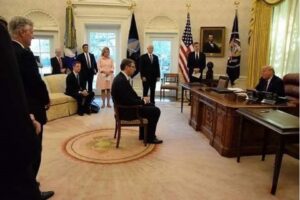
Image: Two Presidents – Vučić and Trump meeting in September 4, Oval Office, Washington DC (Source: unknown)
Nagorno-Karabakh (Republic of Artsakh)
Fighting broke out in Nagorno-Karabakh in September causing thousands of deaths. Cities in the non-recognized Republic of Artsakh were targeted by the Azerbaijani army as well as Azerbaijani cities being targeted by Karabakhi Armenian forces. Turkey backed Azerbaijan in the conflict and there were claims that Turkey flew in Islamists to help fight. Russia, an arms supplier of both Armenia and Azerbaijan, stayed mostly neutral but then the Kremlin orchestrated a ceasefire agreement and brought in peacekeeping forces. Regions outside of the former Autonomous Oblast of Nagorno-Karabakh previously controlled by Karabakhi Armenians, were abandoned and returned to Azerbaijan in November and December. Russian peacekeeping troops control the only road left for transport between Nagorno-Karabakh and Armenia. 70% of the Republic of Artsakh is now being controlled by Azerbaijan, including the strategically important city of Shusha. Russian peacekeepers have conserved the contested status question of the rump Republic of Artsakh for indefinite period. Although no states in the UN have recognized the independence of this de facto state, many politicians and regional governments have made moves of recognition citing its democratic record in comparison to Azerbaijan as well as the perceived threat of genocide against Armenians in the region. Recognition came from Uruguay’s capital city of Montevideo, the city of Milan, as well as the region of Lombardy, the Italian cities of Palermo, Asoli and the Canadian town of Laval. The French Senate voted to urge the government to recognize the disputed Caucasus region of Nagorno-Karabakh as an independent republic.
The Special Collectivity of New Caledonia
In New Caledonia, the second of three independence referendums took place in October. The first referendum in 2018 resulted in 57% of the island dwellers preferring to stay under the control of France. In the October referendum that number had dropped to 53%. The third and final referendum will take place in 2022. Demographics in New Caledonia are strongly correlated to voting tendency; non-Kanaks are much more likely to vote to remain as a part of France while Kanak people are more likely to prefer independence. Although demographics are shifting, this is not expected to make a deciding difference in the next referendum. In December violent protests erupted in relation to nickel production in the region. New Caledonia boasts around 25% of the world’s nickel reserves and keeping nickel profits in the region is at the center of the independence debate.
The Turkish Republic of Northern Cyprus
The October elections in Northern Cyprus resulted in Ersin Tatar, former Prime Minister and conservative hardliner, winning the election against his left-wing incumbent. Tatar has stated that he is a supporter of a two-state solution in Cyprus; this can lead one to the assumption that another round of talks (last ended in 2017) are not likely to start up again any time soon. Prime Minister Ersan Saner noted that as long as the Greek Cypriot government shows no interest in dialogue, the TRNC would turn closer to the ‘Motherland Turkey’. Although this may represent the government’s stance, large protests took place in the TRNC against Turkish influence in domestic affairs, specifically regarding alleged election support of Tatar. Despite protests, Turkish president Erdoğan visited the TRNC in November. Ahead of his visit, the town of Varosha, which has been under the Turkish military control since 1974, was opened up. This move was met with criticism and protests in the Republic of Cyprus. Turkey’s search for oil in Cypriot and Greek waters also heightened tensions in the region. As COVID-19 affected the island, the Green Line, a border which only opened in 2003, was temporarily closed yet again. This separation increased tensions and damaged years of cross-border civil society work. Some claimed that the crisis should bring the island together instead of tearing it apart. Although the North is expected to receive vaccines from the EU as a part of the shared Cypriot health commission, it was Turkey who was the first supplier of vaccines to the TRNC in December. On the search for more recognition, Azerbaijan may soon become the second state to recognize the independence of the TRNC. Pakistan and the Tripoli government of Libya have shown willingness to follow suit, but have not yet made this move.
The State of Palestine
In January, U.S. President Trump unveiled the rest of his “Middle-East plan”. Shortly afterward, Netanyahu announced his plans to annex 30% of the West Bank, assuming the position of the United States would allow this. Israel was met with international criticism and large protests in Palestine. Netanyahu’s plans were not agreed upon by the summer due to shifting positions in Washington, domestic affairs, and the pandemic. As of now, the United States and Guatemala are the only states to have moved their embassies from Tel Aviv to Jerusalem. As part of further peace-plan initiatives from president Trump, a wave of recognition of the State of Israel by Arab states in the Middle East and North Africa has shifted power relations in the region. Following the United Arab Emirates, Bahrain, Sudan, and Morocco have all normalized relations with Israel. Recognition of Palestinian statehood has not changed due to these normalization measures, but it is a reversal of international relations set in 2002 when multiple Arab states vowed not to normalize relations with Israel until Israel recognizes Palestinian statehood. Quite the opposite has occurred; despite the pandemic and domestic political issues in Israel, this year has been record breaking in the number of Palestinian owned houses destroyed in the West Bank and in 2020 alone, over 12,000 Israel construction projects in the West Bank have been approved. The Israeli government has already started vaccinating in Israel, and although human rights organizations in Israel say the government is also responsible for the West Bank and Gaza, Israeli Health Minister Kisch said he would only consider helping Palestine once Israeli needs are met. The Israeli government has already been criticized earlier in December after Public Security Minister Ohana instructed prison officials not to vaccinate Palestinian prisoners. In the meantime, Palestinian officials are scrambling to search for doses of the vaccine and do not expect to vaccinate en masse for another few months.
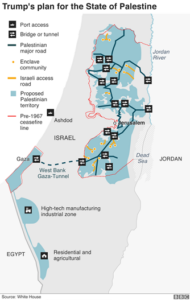
Image: The State of Palestine as proposed by Trump administration in January, 2020 (Source: White House)
Sahrawi Arab Democratic Republic (Western Sahara)
Bolivia withdrew recognition in January. In March, Liberia opened a consulate in Dakhla, which is controlled by Morocco, but without any mention of discontinued recognition of the SADR. In October, Rwanda signed cooperation agreements with Morocco. In addition, Rwanda supported Morocco’s territorial integrity and sovereignty over Western Sahara, but without any mention of discontinued recognition of SADR. Guyana withdrew recognition in November and on the same month Morocco broke a decades-old ceasefire agreement to gain control over a separatist zone between Moroccan controlled Western Sahara and Mauritania. As a result, the SADR declared war against Morocco. Since the conflict, Morocco has cracked down on pro-independence activists. Despite the conflict only lasting a few days, it grabbed international attention. In December, US president Trump granted recognition of Morocco’s sole sovereignty over Western Sahara in return for their improved relations with Israel. U.S. Secretary of State publicized plans to open a consulate to Morocco in the region. Moroccan officials do not expect this recognition to be reversed after Joe Biden takes office in January 2021.
Scotland
As the British government struggled this year through the pandemic, the Brexit negotiations with the EU continued in the background. Although the UK did manage to strike a deal at the last minute, the incompetence in negotiations from throughout the last years increased the discussion around independence in Scotland. The Scottish parliament was recalled from its Christmas holiday after the Brexit deal was announced from British Prime Minister Boris Johnson. Scotland’s First Minister Nicola Sturgeon has, on many occasions, expressed her wish for an independence referendum. Scottish Elections are in 2021, and if the Scottish National Party can win a large majority, a referendum will be more likely. The legality of a referendum is currently being debated; as of now, Boris Johnson would need to approve of a referendum for it to be legal, and he has claimed he would not do this. If everything works in Scotland’s favor, experts suggests a referendum could take place in Spring 2022, it would take around three years to uncouple with the UK and four more to rejoin the European Union.
The Republic of Somaliland
Despite the virus and multiple issues in the horn of Africa, Somaliland was able to make improvements in their status in 2020. In July, Taiwanese officials signed an agreement to open representative offices in Somaliland. The Taiwanese representative hopes for close cooperation in education to help improve “economic and construction talent in Somaliland”. Furthermore, in December, Kenyan President Kenyatta stated that Kenya will open a consulate in Hargeisa, the capital city of the Republic of Somaliland. This move increased tensions between Somalia and Kenya which are already high due to territorial disagreements off the Somali/Kenyan coast. Somaliland president Bihi had a state visit to Djibouti in December as well. This is unlikely to worsen Somalia’s relations to Djibouti, as it is the primary venue to talks between Somalia and Somaliland.
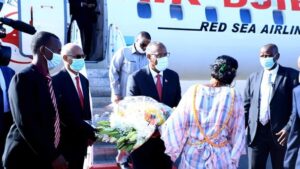
Image: Somaliland President Muse Bihi received by Djibouti officials on December 23 (Source: The East African).
Republic of South Ossetia – the State of Alania
In February, South Ossetia closed a section of their de facto border to Georgia; this was an unpleasant surprise for the ethnic Georgians in the region who relied on travel to Georgia proper for their pensions or medical assistance. The border between Russia and South Ossetia was closed in April to try and stop the spread of COVID-19. Moscow reopened the border in September. In early December, Moscow and Tskhinvali signed a shared customs agreement making trade between Russia and the separatist territory easier and helping to reverse some of the negative effects of the prolonged closure. As the border to Russia reopened, the OSCE made a joint statement in early December expressing their concern over the prolonged closure of the South Ossetian border to Georgia. Russia and the Tskhinvali government have again been accused of ‘borderization’ along the South Ossetian-Georgian de facto border. Fencing and checkpoints have been put up along many areas which cut off some plots of land from their owners. The ambassador of the EU to Georgia called for Moscow and Tskhinvali to refrain from escalating the conflict in this way. Protests in South Ossetia have grown in December over claims of torture at the hands of Ossetian police after a man died in police custody. The protests had small numbers throughout the autumn but grew significantly in December, even gaining support from North Ossetians in Russia. The scandal has led to many resignations and a deadlock of the South Ossetian government.
The Republic of China (Taiwan)
Taiwan’s exclusion from international organizations was highlighted this year during the pandemic. Not officially a member of the WHO, Taiwan was partially on their own in handling the pandemic. Although Taiwan was praised for its handling of COVID-19, criticism was made known as the partial exclusion from WHO is a legitimate health risk. This year, many Western countries broke their silence and also made their stance known in supporting Taiwan’s engagement within the WHA. Considering Taiwan’s quick recovery, the government had a new fear on the horizon. After the changes in law and multiple arrests in Hong Kong, Taiwan fears that the “one country, two systems” notion is no longer meaningful for the government in Beijing. Despite warning from opposition parties that another Tsai administration would worsen relations with Beijing, her reelection this year shows that most Taiwanese support her careful stance in Chinese relations. Taiwan is particularly nervous as U.S. President Trump, who was notably cold and strict in his relations to Beijing, leaves office. The Tsai administration was, however, careful not to lean too much toward Trump in 2020, perhaps in order to avoid Chinese aggression and to prepare for U.S.-Taiwan relations post-Trump. In 2020, there were no changes in diplomatic relations with Taiwan despite China’s attempts throughout the past years to reverse Taiwan’s recognition in some states. Somaliland was the only territory this year that jointly initiated relations with Taiwan.
Tigray Region
In November, the Ethiopian government sent troops into the Tigray region in northern Ethiopia to maintain control over the partially autonomous region. The local government, led by the Tigray People’s Liberation Front, has expressed deep concern about the situation, especially regarding the Eritrean army’s involvement in the region. Addis Ababa claimed by the end of November that the operation has ended, but the Tigray government said it will continue to fight until the Ethiopian control is eliminated. Thousands have been killed, including civilians, and over 50,000 residents of the Tigray region have fled to neighboring Sudan. The violence did not stop in Tigray; in other regions of Ethiopia, independence movements and violence against them were also in the media in 2020. Oromia and Wolayta have also had significant protests this year in relation to their independence movements and the central government has violently reacted. Ethiopia’s constitution has lax laws allowing for regional autonomy and even secession; this laws have amplified independence movements and made the position from Addis Ababa difficult to justify.
Pridnestrovian Moldovan Republic (Transnistria)
Due to the pandemic, the Transnistrian government introduced a state of emergency and closed its borders. The state of emergency lasted until mid-summer. The election of pro-European Maia Sandu in Moldova brought tension to the region. She claimed in December that the Russian troops in Transnistria need to be removed. The pro-Russian president Igor Dodon, that lost the last election to Sandu, made a comment the same day highlighting the importance of the Russian troops in the region, the Kremlin made similar comments and refused to remove troops until an agreement is reached. Parliamentary elections in Transnistria to a slimmed-down separatist parliament changed nothing in Tiraspol. Renewal, the long-time majority party closely tied to the region’s largest company Sheriff, renewed their stronghold. Election turnout was under 30%.
***
In 2020, states closed their borders, global travel slowed down, and states became increasingly concerned with domestic infection rates and, by December, securing enough vaccines for their own population. These circumstances led to some hard lessons to be learned for de facto states and reiterated their dependence on partners and parent-states. Despite difficulties, 2020 had little effect on international recognition of the world’s de facto states. Most states were too preoccupied with domestic affairs related to the pandemic to concern themselves with subordinate international relations. Nevertheless, there were shifts and it will be important to keep these in mind in 2021. The situation in the UK will likely result in interesting developments within the Scottish independence movement, and with a new president in the United States, it will be important to analyze how relations between Israel and its Arab neighbors develop and how these affect the State of Palestine. In the post-Soviet space, few changes are expected. Azerbaijan has cut back the sovereignty claims of Karabakhi Armenians but Maia Sandu is unlikely to achieve anything in Transnistria that previous Moldovan leaders have also failed to do. Considering Morocco has now normalized relations with Israel and successfully gained control over SADR forces last sliver of ocean access and Ethiopia seems to have retaken control over the northern Tigray province, it will be important to monitor African de facto governments in 2021. As the new year rolls in and the vaccine shifts attention away from the pandemic and back to ‘normal issues in international affairs’, we should expect increased levels of progress and degradation in the world’s de facto states.
Author: Lance Bradley




